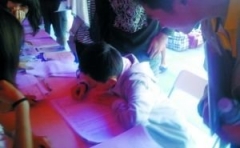|
||||
|
2006年12月23日新四级参考答案Part I Writing 四级英语参考范文: The approach of the Chinese Lunar New Year poses a national issue concerning the necessity of holding the CCTV Spring Festival Gala. Its established status is being challenged by a growing number of people, especially by younger generations. It is increasingly difficult to cater for all tastes. Some individuals deem that it should be canceled or replaced by other programs. These young people focus their attention on other forms of celebration instead of immersing themselves in TV. Despite that, the majority of mid-aged people and senior citizens uphold the importance of the traditional performance. The most striking feature of this gala is its traditionally close link with ordinary people’s lives. Most of people view this gala as an annual staple on the traditional Chinese Spring Festival Eve. They all have a restless night and glue their eyes on the television. I am not supportive of the view that the grand gala should be abandoned. Undoubtedly, it plays a vital role in the celebration of Chinese New Year. To increase its appeal and meet young adults’ need, the upcoming performance should invite some big names including super stars from Hong Kong and Part II Reading Comprehension (Skimming and Scanning) 1. N 2. N 3. Y 4. N 5. Y 6. Y 7. NG 8. move forward 9. looking back 10. the more you get back Part III Listening Comprehension
36. natural 37. usage 38. exception 39. particular 40. reference 41. essays 42. colleagues 43. personal 44. What we may find interesting is that it usually takes more words to be polite 45. but to a stranger, I probably would say “would you mind closing the door?” 46. There are bound to be some words and phrases that belong in formal language and others that are informal. Part IV Reading Comprehension (Reading in Depth)
Part V Cloze
87. adapt to lives in different cultures/adapt (oneself) to living in different cultures 88. nothing is more attractive/appealing to me than reading 89. would have a chance to survive 90. might feel lonely when they are away from home/might feel lonely when away from home 91. at the rate of 12 million people per year/at the speed of 12 million people every year 2006年12月23日新四级听力原文Section B 11. M: Christmas is around the corner. And I’m looking for a gift for my girlfriend. Any suggestions? W: Well you have to tell me something about your girlfriend first. Also, what’s your budget? Q: What does the woman want the man to do? 12. M: What would you like for dessert? I think I’ll have apple pie and ice cream. W: The chocolate cake looks great, but I have to watch my weight. You go ahead and get yours. Q: What would the woman most probably do? 13. W: Having visited so many countries, you must be able to speak several different languages. M: I wish , I could. But Japanese and, of course English are the only languages I can speak. Q: What do we learn from the conversation? 14. M: Professor Smith asked me to go to his office after class. So it’s impossible for me to make it to the bar at ten. W: Then it seems that we’ll have to meet an hour later at the library. Q: What will the man do first after class? 15. M: It’s already 11 now. Do you mean I ought to wait until Mr. Bloom comes back from the class? W: Not really. You can just leave a note. I’ll give it to her later. Q: What does the woman mean? 16. M: How is John now? Is he feeling any better? W: Not yet. It still seems impossible to make him smile. Talking to him is really difficult and he gets upset easily over little things. Q: What do we learn about John from the conversation? 17. M: Do we have to get the opera tickets in advance? W: Certainly. Tickets at the door are usually sold at a higher price. Q: What does the woman imply? 18. M: The taxi driver must have been speeding. W: Well, not really. He crashed into the tree because he was trying not to hit a box that had fallen off the truck ahead of him. Q: What do we learn about the taxi driver? Questions 19 to 21 are based on the conversation you have just heard. W: Hey, Bob, guess what? I’m going to visit But while I’m there I’d also like to do some sightseeing. M: That’s nice, Shelly. But do you mean the W: I mean the province. My friend’s wedding is in M: Well, Many people think so because it’s the biggest city. But it’s not the capital. W: Wow, and do you think I can get by in English? My French is OK, but not that good. I know most people there speak French, but can I also use English? M: Well, People speak both French and English there. But you’ll hear French most of the time. And all the street signs are in French. In fact, W: Good advice. What about M: It’s a beautiful city, very old. Many old buildings have been nicely restored. Some of them were built in the 17th or 18th centuries. You’ll love there. W: Fantastic. I can’t wait to go. 19. What’s the woman’s main purpose of visiting 20. What does the man advise the woman to do before the trip? 21. What does the man say about the Questions 22 to 25 are based on the conversation you have just heard. M: Hi, Miss Rowling, how old were you when you started to write? And what was your first book? W: I wrote my first Finnish (finished) story when I was about six. It was about a small animal, a rabbit, I mean. And I’ve been writing ever since? M: Why did you choose to be an author? W: If someone asked me how to achieve happiness. Step One would be finding out what you love doing most. Step two would be finding someone to pay you to do this. I consider myself very lucky indeed to be able to support myself by writing M: Do you have any plans to write books for adults? W: My first two novels were for adults. I suppose I might write another one. But I never really imagine a target audience when I’m writing. The ideas come first. So it really depends on the ideas that grasp me next. M: where did the ideas for the “Harry Potter” books come from? W: I’ve no ideas where the ideas came from. And I hope I’ll never find out. It would spoil my excitement if it turned out I just have a funny wrinkle on the surface of my brain, which makes me think about the invisible train platform. M: How did you come up with the names of your characters? W: I invented some of them. But I also collected strange names. I’ve got one from ancient saints, maps, dictionaries, plants, war memoirs and people I met. M: Oh, you are really resourceful. 22. What do we learn from the conversation about Miss Rowling’s first book? 23. Why does Miss Rowling consider her so very lucky? 24. What dictates Miss Rowling’s writing? 25. According to Miss Rowling where did she get the ideas for the Harry Porter books? Section B Directions: In this section, you will hear 3 short passages. At the end of each passage, you will hear some questions. Both the passage and the questions will be spoken only once. After you hear a question, you must choose the best answer from the four choices marked A), B), C) and D). Then mark the corresponding letter on Answer Sheet 2 with a single line through the centre. Passage One Reducing the amount of sleep students get at night has a direct impact on their performance at school during the day. According to classroom teachers, elementary and middle school students who stay up late exhibit more learning and attention problems. This has been shown by 26. What were teachers told to do in the experiment? 27. According to the experiment, what problem can insufficient sleep cause in students? 28. What message did the researcher intend to convey to parents? Passage Two Questions 29 to 32 are based on the passage you have just heard. Patricia Pania never wanted to be a public figure. All she wanted to be was a mother and home-maker. But her life was turned upside down when a motorist, distracted by his cell phone, ran a stop sign and crashed into the side of her car. The impact killed her 2-year-old daughter. Four months later, Pania reluctantly but courageously decided to try to educate the public and to fight for laws to ban drivers from using cell phones while a car is moving. She wanted to save other children from what happened to her daughter. In her first speech, Pania got off to a shaky start. She was visibly trembling and her voice was soft and uncertain. But as she got into her speech, a dramatic transformation took place. She stopped shaking and spoke with a strong voice. For the rest of her talk, she was a forceful and compelling speaker. She wanted everyone in the audience to know what she knew without having to learn it from a personal tragedy. Many in the audience were moved to tears and to action. In subsequent presentations, Pania gained reputation as a highly effective speaker. Her appearance on a talk show was broadcast three times, transmitting her message to over 40 million people. Her campaign increased public awareness of the problem, and prompted over 300 cities and several states to consider restrictions on cell phone use. 29. What was the significant change in Patricia Pania’s life? 30. What had led to Pania’s personal tragedy? 31. How did Pania feel when she began her first speech? 32. What could be expected as a result of Pania’s efforts? Passage Three Questions 33 to 35 are based on the passage you have just heard. Many people catch a cold in the spring time or fall. It makes us wonder if scientists can send a man to the moon. Why can’t they find a cure for the common cold? The answer is easy. There’re actually hundreds of kinds of cold viruses out there. You never know which one you will get, so there isn’t a cure for each one. When a virus attacks your body, your body works hard to get rid of it. Blood rushes to your nose and causes a blockade in it. You feel terrible because you can’t breathe well, but your body is actually eating the virus. Your temperature rises and you get a fever, but the heat of your body is killing the virus. You also have a running nose to stop the virus from getting into your cells. You may feel miserable, but actually your wonderful body is doing everything it can to kill the cold. Different people have different remedies for colds. In the 33. According to the passage, why haven’t scientists found a cure for the common cold? 34. What does the speaker say about the symptoms of the common cold? 35. What do some scientists say about taking medicines for the common cold, according to the passage? |
| [发布者:qiuyu] | |||
|
 当前位置:
当前位置:










